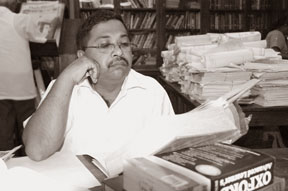|
observer |
|
|
|
|
|
OTHER LINKS |

|

|

|
Will learn French? But Tamil? Never:Tongues at war
"We will encourage all public servants to learn a second language, Sinhalese should learn Tamil and Tamils should learn Sinhala." Though he aimed the kick at the right time, it remains to be seen if the momentum too is right and if the ball will ultimately reach the goalpost. Rather learn FrenchIt's easy to be skeptical in the light of what each community thinks about learning the language of the other. "I can't speak Tamil" confesses twenty-five year old Iranthi. "If I am given the opportunity to learn another language, I will rather learn French. Why? Because then, I might have a chance of finding a job as an air hostess." Nineteen year old Shane too, who has just completed his Advanced Level exams is about to join a Course to learn Japanese because he hopes to join his brother-in-law's gem business where the customers are mostly tourists. "I like to learn Japanese because in business the best language to use is the language of your customer". He too confesses he knows only one or two words of Tamil and does not feel the necessity of broadening his vocabulary or learning to speak and write the language of his Tamil brethren. "I have Tamil friends, and all of them speak fluent Sinhala. So, why should I bother to learn Tamil?" Yet, he admits that learning Tamil would have been much easier than learning a foreign language like Japanese, which he never gets to hear in his daily life except for the two hours during classes. "Attitude" says my colleague working for a Tamil newspaper. "The Sinhalese have an attitude problem. They just don't want to learn Tamil". Citing India as an example, she says the average Indian is capable of speaking at least three languages. "If so, why can't the Sinhalese too pick up our language? After all our cultures are the same and I feel there is not that much of a difference between the two languages. We never spoke in Sinhala at home when I was a child, but I picked up the Sinhala language when I played with the Sinhala children in the neighbourhood. It is strange why Sinhala people can't do the same". Raising the question if Sri Lanka has been split into two because of the differences in the languages we speak, Thiagarajah, a clerk in a tea estate in Thalawakelle says "One of the biggest barriers between us and the Sinhalese is the language barrier." Thiagarajah together with many others, hailing from both communities seem to believe if the deep linguistic schism could be eliminated the ethnic conflict too would be solved. C. Pathirana, a retired officer of the National Institute of Education, recalls the past, before the invasion of the British and wonders how our ancestors would have conversed without a link language. "Sinhala Kings who married Tamil Princesses would have learnt each other's languages". BilingualA successful marketing manager in a pharmaceutical company Ganesh (not his real name) says "I learned Sinhala after I came to Colombo. Just getting a good job here often means you have to be bilingual. We often need sales-representatives who can speak Tamil and Sinhala. So more people are trying to be bilingual." One person who has taken the cue seems to be the Swiss Ambassador, Bernidino Regazzoni. To quote Bandula Jayasekara in "Hoppers, pol-sambol...and Regazzoni", he has said 'I have learnt things fast. I know the Buddhist way, the Hindu way, the Sinhala way and the Tamil way and I will even learn to chant Pirith soon." In spite of these sentiments, there appears to be no widespread cry for Sinhalese to learn Tamil and vice versa. Nobody's certainly beating down the doors. "The Tamil language course we conducted for government servants is now defunct" says a spokesperson at the Sri Lanka Foundation Institute. She believes the course could not be continued mainly because the participants found the course fee of Rs 10,000 too exorbitant. In much the same way the Sinhalese are not eager to learn Tamil, there are Tamils too who do not feel the need to learn any other language. "I value my precious tongue too much to try and twist it into speaking another language", says staunch Wellamma, a tea-plucker in a vehement tone, to my translator, Weerakoon as I question her at Galkandawatte, in Thalawakelle. "How would she manage when she steps outside the tea-estate and meet Sinhala people" "I have never stepped outside Galkandawatte" says Wellamma. "Never even been to Thalawakelle". Employment opportunitiesBut, she confesses, she has grandchildren who can speak Sinhala. "They have to learn Sinhala to find employment." She explains. Thiagarajah too agrees. "Simply knowing Tamil limits your employment opportunities." Elaborating further he says "If you know Tamil You can either join the Official Languages Department or become a teacher. But to find any other job you have to know English or Sinhala". Fairyah from Beruwela, who had learnt Sinhala as a second language at school says. "I'm more fluent in Sinhala than my parents. My mother uses a splattering of Sinhala to speak with the malukaraya and the pol kadana miniha, and my father too, can get by, but speaks in a heavy accent." It's surely difficult for a society to operate in this manner. It is surely time that we seriously implemented the Official Languages Act introduced in 1987 and become a duel language society. The idea should be to get everyone to speak both languages; to become fluent, literate, and familiar with both cultures, so that everyone will be 'in place" anywhere and "at home" everywhere ...in a profoundest sense, a true citizen of Sri Lanka. |










